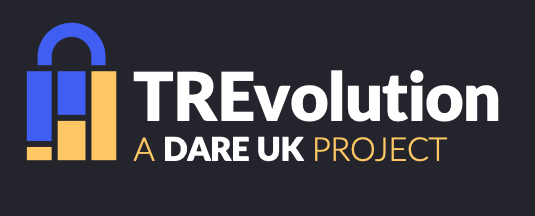TREvolution

Building on the outputs of past DARE UK Driver Projects to advance research capabilities of Trusted Research Environments
- Website: https://dareuk.org.uk/how-we-work/ongoing-activities/trevolution/
- Started: March 1, 2025
- Duration: 25 months
- Project reference: https://gtr.ukri.org/projects?ref=MC_PC_24038
TREs in the UK are internationally renowned for establishing the Five Safes framework, but they have some limitations for researchers. The manual application processes and disclosure checks make it challenging to keep up with today’s scientific needs, like federated learning, analysis across sectors and research domains, and large-scale correlation studies.
TREvolution will address these challenges to evolve UK TRE capabilities across three themes:
- TRE reference architecture and implementations: Standardising UK TRE architectures to enable seamless interoperability.
- AI and semi-automated output checking: Enhancing research output review processes to ensure non-disclosure of personal information.
- Federated analysis: Enabling secure analysis of datasets stored in multiple TREs located across the UK.
In addition to the the Universities of Nottingham, Dundee, Manchester, Swansea and West of England, the work will be delivered in collaboration with NHS Scotland, Lancashire Teaching Hospital, Durham University, Lancaster University, University College London, University of Queensland, University of Basel and University of Cape Town.
It builds on existing work done by the delivery partners, with experience across the themes, as well as the DARE UK (Phase 1) Driver Projects, which developed initial versions of some of the key components of TREvolution.
In the first collaboration, The University of Manchester established Five Safes RO-Crate: a mechanism of structurally documenting the evidence of computational processes, along with the chain of human reviews for legally accessing sensitive data. Five Safes RO-Crate is based on open Web standards and wider community efforts and has been adopted by several research projects in the European Open Science Cloud (EOSC) including EOSC-ENTRUST, and forms the basis for the common metadata standard of TREvolution.
TREvolution is the first of three initiatives under the DARE UK (Phase 2) Transformational Programme, advancing the further development and testing of core TRE components and capabilities developed in the first phase of the DARE UK programme.
Further funding will also be provided to support the early adoption of these capabilities by UK TREs and data services and to demonstrate their application through real-world research exemplars. The goal is to showcase the potential for a connected and efficient national network of secure data infrastructures.
The TREvolution team will work closely with the DARE UK Delivery Team and early adopter TREs, fostering stronger collaboration and synergy as these critical capabilities are integrated into the UK’s secure data research infrastructure ecosystem.
Objectives
- Objective 1: Common standards for federation-ready, auto-assisted TREs: next generation of TREs to be underpinned by a common understanding and definition, and enhanced FAIR metadata, aligned with international initiatives
- Objective 2: Consistent real-time decision support for scaling trust: semi-automated, assistive process, where the risk of an analysis being disclosive is assessed in real time
- Objective 3: Standardising compute environments for scaling analytics: adoption of internationally accepted mechanisms to abstract the coding language from the computational environment
- Objective 4: Enabling a TRE network: collaboration of TREs that for a given project can form a transient inter-connected network
- Objective 5: Maintaining trust: build on DARE UK programme of public and stakeholder engagement where we have included their voices and inputs into our earlier projects
Work packages and tasks
- WP1: Specifying a TREvolution SATRE Profile
- Task 1.1: TREvolution Profile for Federation
- Task 1.2: Enhanced Metadata: FAIR Five Safes
- Task 1.3: Single Specification
- WP2: Building a Single Reference Implementation
- Task 2.1: Vendor-Neutral Implementation
- Task 2.2: Front Door TRE
- Task 2.3: Federated Nodes: TRE and Compute & Execution
- Task 2.4: Disclosure Control via SACRO
- Task 2.5: TREvolution FAIR metadata framework
- WP3: Tools and Demonstrators
- Task 3.1: Semi-Automated Disclosure Control
- Task 3.2: Machine Learning adoption in TREs
- Task 3.3: Governance for adoption
- Task 3.4: Platforms and federated analytics providers
- WP4: Stakeholder Engagement and Communications
- Task 4.1: Public Involvement and Engagement
- Task 4.2: Engagement TREs and Data Owners
- Task 4.3: Engagement with researchers
- Task 4.4: Communications
- WP5: Management
- Task 5.1: Cross-programme Management
- Task 5.2: Risk Register
eScience Lab involvement
The eScience Lab is leading the TREvolution approach to FAIR (Findable, Accessible, Interoperable, Reusable) and transparent analysis of sensitive data and use of RO-Crate.
The eScience Lab is expanding on its effort in the federated analytics programme in Health Data Research UK, building on two decades of experience providing computational analysis and data infrastructure to internationally support open research practices in life sciences and other disciplines.
Related references and outreach by TREvolution team
Christian Cole, Philip Quinlan, Jim Smith, Stian Soiland-Reyes, Simon Li, Alexander Hambley, Tim Machin, Simon Thompson, Gordon Milligan, Antony Chuter, Rob Baster (2025):
The TREvolution Profile.
DARE UK / Zenodo (project deliverable)
https://doi.org/10.5281/zenodo.15479820
Eli Chadwick, Warren Del-Pinto, Alexander Hambley, Stian Soiland-Reyes (2025):
Demystifying RO-Crate: An introduction to RO-Crate for TREvolution and DARE Early Adopters.
DARE TREvolution webinar 2025-05-22
https://doi.org/10.5281/zenodo.15641886 [video]
Eli Chadwick, Stian Soiland-Reyes, Phil Reed (2025):
RO-Crate: Capturing FAIR research outputs in bioinformatics and beyond.
(poster, flash talk)
Bioinformatics Open Science Conference (BOSC 2025).
Intelligent Systems for Molecular Biology and European Conference on Computational Biology (ISMB/ECCB 2025), Liverpool, Manchester, 2025-07-20/–24.
https://doi.org/10.5281/zenodo.15849770
Phil Quinlan (2025):
Introducing TREvolution.
HDR UK Midlands, 2025-06-24
Phil Quinlan (2025):
Introducing TREvolution.
TREvolution + DARE UK Early Adopters, 2025-06-24
Phil Quinlan (2025):
Introducing TREvolution.
TREvolution + DARE UK Early Adopters, 2025-06-24
Michelle Amugi, Rob Baxter, Christian Cole, Carole Goble, Emily Jefferson, Fergus McDonald, Andrew Morris, Philip Quinlan, David Seymour, Jim Smith, Balint Stewart, Simon G. Thompson (2025):
A Federated Architecture for a National Data Library.
Wellcome Trust (report) / DARE UK
https://doi.org/10.5281/zenodo.14672004
Eli Chadwick, Stian Soiland-Reyes, José María Fernández, Björn Grüning, Carole Goble (2025):
RO-Crate – Capturing FAIR research outputs throughout the ELIXIR landscape.
ELIXIR All Hands Meeting (AHM2025), Thessaloniki, Greece, 2025-06-02/–05.
F1000Research 14(ELIXIR):543 (poster)
https://doi.org/10.7490/f1000research.1120199.1
Paula Iborra, José M. Fernández, Laia Codó, Eugenio Gonzalo, Stian Soiland-Reyes, Alexander Hambley, Jonathan Couldridge, Carole Goble, Philip Quinlan, Salvador Capella-Gutierrez (2025):
ENTRUSTing WfExS 1.0 with WES and TES.
ELIXIR All Hands Meeting (AHM2025), Thessaloniki, Greece, 2025-06-02/–05.
F1000Research 14(ELIXIR):518 (poster)
https://doi.org/10.7490/f1000research.1120178.1
eScience Lab (2025):
Launch of TREvolution.
University of Manchester (Press release)
https://www.manchester.ac.uk/about/news/new-62-million-programme-to-build-and-test-new-capabilities-for-sensitive-data-research/
Stian Soiland-Reyes, Stuart Wheater, Thomas Giles, Jonathan Couldridge, Phil Quinlan, Carole Goble (2025):
Five Safes RO-Crate: FAIR Digital Objects for Trusted Research Environments.
International FAIR Digital Objects Implementation Summit 2024 (FDO2024), Berlin, Germany, 2024-03-20/–21.
Open Conference Proceedings 5
https://doi.org/10.52825/ocp.v5i.1419
